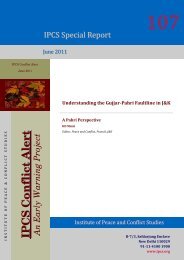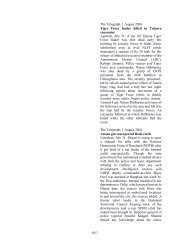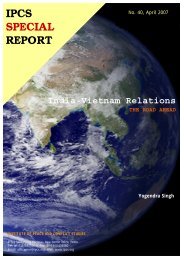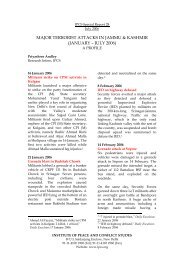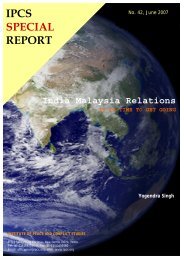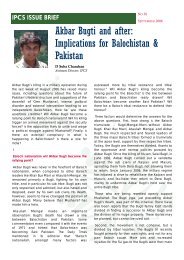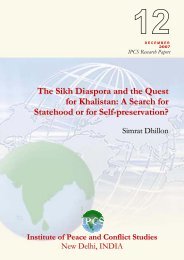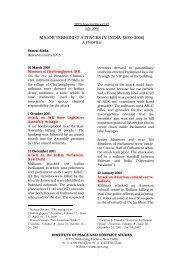April-June 2013 - Institute of Peace and Conflict Studies
April-June 2013 - Institute of Peace and Conflict Studies
April-June 2013 - Institute of Peace and Conflict Studies
Create successful ePaper yourself
Turn your PDF publications into a flip-book with our unique Google optimized e-Paper software.
Commentary<br />
Bangladesh: An Analysis <strong>of</strong> Pranab Mukherjee's Visit<br />
Harun ur Rashid<br />
Former Bangladesh Ambassador to the UN, Geneva<br />
President Pranab Mukherjee arrived in Dhaka on 3 March for<br />
a three-day visit to Bangladesh at the invitation <strong>of</strong> the<br />
President <strong>and</strong> Prime Minister <strong>of</strong> Bangladesh. Highly respected<br />
in Bangladesh for his modesty <strong>and</strong> affability, Mukherjee has<br />
close personal connections with the country, through his wife,<br />
who hails from the Sadar Upazilla <strong>of</strong> Narail. During his recent<br />
visit, President Mukherjee received an honorary doctorate<br />
degree at a Convocation <strong>of</strong> Dhaka University <strong>and</strong> visited the<br />
ancestral home <strong>of</strong> his in-laws in Bhadrabila village, Narail in<br />
Sadar sub-district. According to media reports from<br />
Bangladesh, Kanai Lal Ghosh, the president's brother-in-law,<br />
is currently residing at the ancestral home.<br />
Politically speaking, too, Mukherjee is no stranger to<br />
Bangladesh. During the 1971 War <strong>of</strong> Liberation, he was one <strong>of</strong><br />
the main Indian political leaders who supported <strong>and</strong> assisted<br />
the provisional government <strong>of</strong> Bangladesh <strong>and</strong> the people <strong>of</strong><br />
Bangladesh bear a debt <strong>of</strong> gratitude to him. Indeed, he<br />
received the 'Bangladesh Swadhinata Sammanona<br />
(Bangladesh Freedom Honour)' a state honour for his<br />
outst<strong>and</strong>ing contribution to the Liberation War. The<br />
government <strong>of</strong> Bangladesh, led by the Bangladesh Awami<br />
League, first started honouring foreign allies for their<br />
contribution to the country's liberation war in 2011, when the<br />
government posthumously conferred the Bangladesh<br />
Swadhinata Sammanona upon former prime minister <strong>of</strong> India,<br />
the late Indira G<strong>and</strong>hi. Her daughter-in-law <strong>and</strong> Congress<br />
President, Sonia G<strong>and</strong>hi received the honour on her behalf on<br />
July 25, 2011.<br />
The majority <strong>of</strong> people in the smaller neighbouring countries<br />
in the vicinity around India perceive it to be the larger <strong>and</strong><br />
more resourceful neighbour. There is both admiration <strong>and</strong><br />
apprehension in these perceptions. Admiration is felt because<br />
this particular neighbour, having common bonds <strong>of</strong> history<br />
<strong>and</strong> geography, has been emerging as a global <strong>and</strong> a regional<br />
political <strong>and</strong> economic power. Apprehension emanates from a<br />
more strained scenario when these smaller neighbours are<br />
not sure <strong>of</strong> their position in a fluid geopolitical environment.<br />
Under such circumstances, an Indian presidential visit to any<br />
foreign country in the neighbouring vicinity is not only highly<br />
ceremonial but diplomatically symbolic. It goes without<br />
saying that no presidential visit can take place without the<br />
approval <strong>of</strong> the Indian government. Usually, a list <strong>of</strong> countries<br />
is prepared, to which the ceremonial visit <strong>of</strong> the Indian<br />
President will take place, taking into account India's national<br />
<strong>and</strong> regional interests.<br />
believe Bangladesh may consider seriously looking<br />
eastwards, <strong>and</strong> eventually form a cooperative institutional<br />
relationship with Myanmar, Thail<strong>and</strong>, <strong>and</strong> China, given the<br />
geopolitical shift <strong>of</strong> power towards the Asia-Pacific at the<br />
dawn <strong>of</strong> the twenty-first century. Domestically speaking, India<br />
also realizes that it needs Bangladesh because <strong>of</strong> its<br />
geographic location, especially because <strong>of</strong> the advantages<br />
that Bangladesh holds in terms <strong>of</strong> transit/trans-shipment <strong>of</strong><br />
goods through the latter country to India's north-eastern<br />
states via West Bengal.<br />
In this context, relations between India <strong>and</strong> Bangladesh have<br />
been on the upswing ever since Sheikh Hasina took power in<br />
2009. Prime Minister Hasina visited New Delhi in January<br />
2010 <strong>and</strong> Indian Prime Minister Manmohan Singh was in<br />
Dhaka in September 2011. Dhaka moved quickly to address<br />
Delhi's concerns on cross-border terrorism <strong>and</strong> transit/transshipment<br />
to India's north-east, given the proper<br />
infrastructure in place for it. Transit on an experimental basis<br />
was provided to India by Bangladesh in 2011. However, the<br />
promises made by India, in return for Bangladesh's<br />
acquiescence on issues such as these, remain unfulfilled.<br />
Nevertheless, President Mukherjee's first foreign visit to<br />
Bangladesh demonstrates that the Indian government does<br />
indeed attach great importance to the existing cooperative<br />
relations with Bangladesh in various sectors.<br />
There is a saying that one can choose friends but not<br />
neighbours. As a regional power, however, India needs to<br />
cultivate good relationships with its neighbouring countries. If<br />
neighbouring countries, such as Bangladesh, Bhutan <strong>and</strong><br />
Nepal, do not respond positively to India's overtures, it may<br />
be difficult for India to achieve its regional goals, while<br />
catering to its global ambitions. Bangladesh <strong>and</strong> India are<br />
neighbours <strong>and</strong> they cannot re-fashion geography. The two<br />
countries are destined to live next to each other. Given the<br />
desire to live together in cooperation, two countries may<br />
proceed with productive relations through unrelenting efforts<br />
in political, economic, social <strong>and</strong> environmental issues.<br />
India is aware that the geopolitical scene around South Asia<br />
<strong>and</strong> South East Asia is in a fluid state. Bangladesh not only<br />
shares borders with India, but also with reformist Myanmar<br />
<strong>and</strong> is also a near neighbour to China, Nepal <strong>and</strong> Bhutan. If<br />
India has strained relations with Bangladesh, some analysts<br />
South Asia Plus 23








